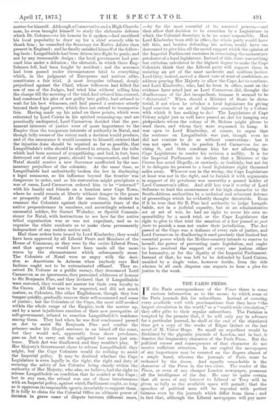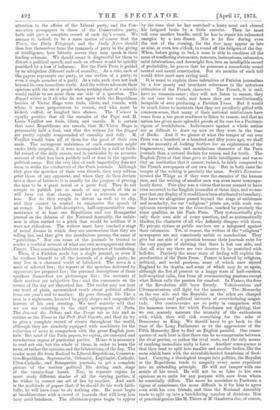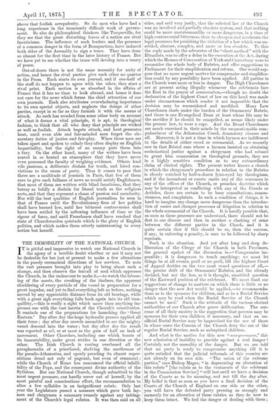THE PARIS PRESS.
N the Paris correspondence of the Times there is some curious information as to the means by which some of the Paris journals fish for subscribers. Instead of covering every available wall with proclamations that they have "the largest circulation in the world," or a "world-wide circulation," they offer gifts to their regular subscribers. The Parisian is tempted by the promise that, if he will only pay in advance for a particular journal, he shall at the end of the stipulated time get a copy of the works of Edgar Quinet or the last novel of M. Victor Hugo. So small an expedient would be disdained by the gigantic journals of London, and in fact, it denotes the fragmentry character of the Paris Press. But the political causes and consequences of that character do not receive sufficient attention. In our capital the newspapers of any importance may be counted on the fingers almost of a single hand, whereas the journals of Paris must be reckoned by the dozen. And equally remarkable is the character of the Press in the two cities. The reader of the Times, or even of any cheaper London newspaper, possesses all the intelligence of the day. He may be quite certain that all news of any interest to Liberal or Tory will be given as fully as the available space will permit ; that the speeches of political men will be reported with perfect fairness even by the journals which differ from them ; and in fact that, although the Liberal newspapers will pay more attention to the affairs of the Liberal party, and the Con- servative newspapers to those of the Conservative party, both will give a complete record of each day's events. We assume it, indeed, to be a mere matter of course that the Times, the Daily Telegraph, and the Daily News should thus free themselves from the trammels of party in the giving of intelligence, how bitterly soever they may speak in their leading columns. We should count it disgraceful for them to distort a political speech, and such an offence would be quickly punished by a loss of influence. But the Paris Press is guided by an altogether different code of morality. As a rule, each of the papers represents one party, or one section of a party, or even a single member of a party. As a rule, each does not look beyond its own immediate circle. And the writers advocate their opinions with the air of people whom nothing short of a miracle would enable to see more than one side of a question. The Rappel writes as if all who do not agree with the Republican heroics of Victor Hugo were fools, idiots, and rascals, with whom it were preposterous to reason, and who must be
kicked, cuffed, or laughed into slience. The Univers is equally positive that all the enemies of the Pope and M. Louis Veuillot are fools, idiots, and rascals. It is certain that most Republicans are rascals, that M. Victor Hugo is presumably half a fool, and that the writers for the Rappel are pretty equally compounded of rascality and folly. M. Veuillot would burn all of them for the good of their own souls. The outrageous unfairness of such comments might excite little surprise, if it were accompanied by a full or faith- ful record of the daily events, and in particular by an accurate account of what has been publicly said or done in the opposite political camp. But the very idea of such impartiality does not seem to strike the conductors of the Paris journals. Although they give the speeches of their own friends, they very seldom print those of any opponent, and when they do thus deviate into a show of fairness, it is usually for the purpose of proving the man to be a great rascal or a great fool. They do not scruple to publish just as much of any speech of his as will bear out that charge, and not a sentence more or less. Nor do they scruple to distort as well as to clip, and they cannot be trusted to summarise the speech of an enemy. In the half-descriptive, half-argumentative com- mentaries of at least one Republican and one Bonapartist journal on the debates of the National Assembly, the unfair- ness is often carried to a pitch that would be sublime if it- were not ridiculous. The writers must have reached a stage of moral disease in which they are unconscious that they are telling lies, and they give the mendacious process the name of 1:patriotism." Nor can some of the journals be trusted to render a truthful account of what our own newspapers say about France. They sometimes fabricate under pretence of translating.
Thus, if a Parisian reads but a single journal, or even if he confines himself to all the journals of a single party, he may live in a charmed world of falsehood. The news is a mass of selected lies ; the reports of the speeches delivered by opponents are prepared lies ; the personal descriptions of those speakers themselves are picturesque lies ; the accounts of their motives are subjective lies ; and the comments on the events of the day are rhetorical lies. The reader may not hear one word of plain, unvarnished truth about political affairs from one year's end to another. He goes through life like a man in a nightmare, haunted by grisly shapes and unspeakable horrors of his own creating. We need scarcely add that we are not referring to the chief newspapers of Paris. The Journal des Debats and the Temps are as fair and as serious as the Times or the Pall Mall Gazette, and they do try to give a complete record of events throughout the world, although they are slenderly equipped with machinery for the collection of news in comparison with the great English jour- nals. But most of the Paris papers, we repeat, are one-eyed and mendacious organs of particular parties. Hence it is necessary to read not one, but the whole of them, in order to learn the news, or rather the opinions and the fabrications, of the day. The reader must flit from Radical to Liberal-Republican, Conserva- tive-Republican, Septennatist, Orleanist, Legitimist, Catholic, Ultra-Catholic, and Bonapartist journals, to get a complete picture of the restless political life during each stage of the twenty-four hours. Nay, in separate organs he must study different shades of all the varying parties, if he wishes to correct one set of lies by another. And such is the multitude of papers that, if he should do his work faith- fully, he will have time to do nothing else. He must begin at breakfast-time with a crowd of journals that will keep him busy until luncheon. The afternoon-papers begin to appear
by the time that he has snatched- a hasty meal and cleared his fatigued brain by a little exercise. Then he must
toil over another bundle, until he has to repair his exhausted energies by a late dinner. Nor is he free during even the rest of the evening, for the Soir may appear as late as nine, or even ten o'clock, to round off the fatigues of the day. When, before going to bed, a man is able to condense all the mass of conflicting statements, rumours, insinuations, calumnies, mild fabrications, and downright lies, into an intelligible record of probability, he proves that he possesses a remarkably sound mental and moral constitution. But six months of such toil would drive most men raving mad.
It is usual to explain these infirmities of Parisian journalism by a few jaunty and trenchant references to the notorious infirmities of the French character. The French, it is said, have no common-sense ; they will not listen to reason, they do not care for truth, and hence they are constitutionally incapable of ever producing a Parisian limes. But it would be much fairer to maintain that they are peculiarly gifted with common-sense, that many of their national misfortunes have come from a too great readiness to listen to reason, and that no nation has given more splendid proofs of its care for a Puritanic rigour of truthfulness. Indictments against a whole nation are as difficult to draw up now as they were in the time of Burke. And if we glance at what the temper of our own Press was a hundred or a hundred and fifty years ago, we shall see the necessity of looking further for an explanation of the
fragmentary, unfair, and mendacious character of the Paris journals than a natural disdain for reason and for truth. The English Press of that time gave so little intelligence and was so tiny an institution that it cannot, indeed, be fairly compared to the French newspapers of our own day. But in both eases the temper of the writing is precisely the same. Swift's Examiner treated the Whigs as if they were the enemies of the human race, and the writing of smaller men was even more unscrupu- lously fierce. Fair-play was a virtue that never seemed to have even occurred to the English journalist of those days, and we sus- pect that any display of it would have been attributed to treachery. Nor have we altogether passed beyond the stage of unfairness and mendacity, for our "religious" prints are, with such con- spicuous exceptions as the Guardian, marked by precisely the same qualities as the Paris Press. They systematically give only their own side of every question, and as systematically blacken the character of all who defiantly disagree with them. No private virtues or public services are a safeguard against their calumnies. Yet, of course, the writers of the "religious" newspapers are not consciously unfair or mendacious. They give but one side of a question because their journals exist for the very purpose of showing that there is but one side, and that all who say there are two deserve to be punished with hell-fire. Precisely the same state of feeling will explain the peculiarities of the Paris Press. France is heated by religious, political, and social passions, some of which once stirred England to its depths, and some of which may do so again, although she lies at present in a happy state of half-careless, half-sceptical calm, free from all overmastering passions except what Renan calls the passion for comfort. In France, the fires of the Revolution still burn fiercely. Voltaireanism and Ultramontanism still fight for the mastery. The Monarchy on the one side and the Republic on the other are charged with religious and political interests of overwhelming magni- tude. Our controversies are so petty in comparison with the immense issues for which Frenchmen are fighting, that we can scarcely measure the intensity of the enthusiasm with which they will risk everything for the sake of Democracy as King. We should have to go back to the time of the Long Parliament or to the aggressions of the Fifth Monarchy Men to find an English parallel. One conse- quence of such heat is that there can be no compromise between the rival parties, or rather the rival sects, and the only means of reaching immediate unity is force. Another consequence is that they tend to split into smaller and smaller bodies, like the sects which burn with the sevenfold-heated fanaticism of Scot- land. Carrying a theological temper into politics, the Royalist or the Republican tends to magnify every mere expedient into an unbending principle. He will not tamper with one article of his creed. He will not be so false to his own opinions as to unite for any purpose with men from whom he essentially differs. The more he nourishes so Puritanic a rigour of conscience' the more difficult is it for him to agree even with his own friends, and thus the National Assembly tends to split up into a bewildering number of divisions. Men of practical genius like M. Thiers or M. Gambetta rise, of course,
above that foolish scrupulosity. So do men who have had a long experience in the immensely -difficult work of govern- ment. So also do philosophical thinkers like Tocqueville, for they see that the great disturbing forces of a nation are rival fanaticisms. The influence of such leaders and the presence of a common danger in the form of Bonapartism, have induced both sides of the Assembly to sign a truce. They have done so almost for the first time in the later history of France. But we have yet to see whether the truce will develop into a treaty of peace.
Out-of-doors there is not the same necessity for unity of action, and hence the rival parties give each other no quarter in the Press. Each starts its own journal, and if one-half of the staff do not happen to agree with the other, they start a rival print. Each section is so absorbed in the affairs of France that it has no time to look abroad, and hence it does not care for the news which forms the chief attraction of our own journals. Each also attributes overwhelming importance to its own special objects, and neglects the doings of other parties, except in so far as they furnish it with the means of attack. As each has seceded from some other body on account of what it deems a vital principle, it is apt, in theological fashion, to think that all who deny that principle are wicked as well as foolish. Attack begets attack, and heat generates heat, until even able and fair-minded men forget the ele- mentary duties of justice and fair-play. When these men are taken apart and spoken to calmly they often display an English impartiality, but the sight of an enemy puts them into a fury. On the other hand, many of the writers have been reared in so heated an atmosphere that they have never even possessed the faculty of weighing evidence. Others lend vile passions, a deliberate disdain for truth, and hired con- victions to the cause of party. Thus it comes to pass that there are a multitude of journals in Paris, that few of them care to give such fullness of news as would satisfy Englishmen, that most of them are written with blind fanaticism, that they betray as boldly a disdain for literal truth as the religious sects, and that they represent a chaos of passion and mendacity. Nor will the best qualities of English journalism be seen in that of France until the Revolutionary fires of her politics shall have burned low, until her bitterest controversies shall have been settled by the softening influence of time or the rigour of force, and until Frenchmen shall have reached that state of Churchwarden quietude which is the glory of English politics, and which makes them utterly uninteresting to every nation but herself.




































 Previous page
Previous page